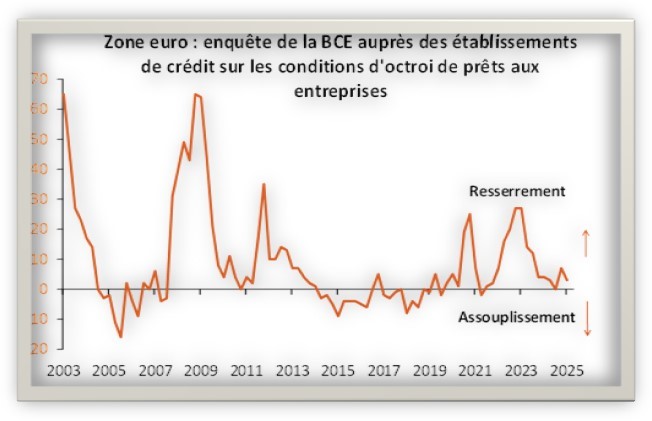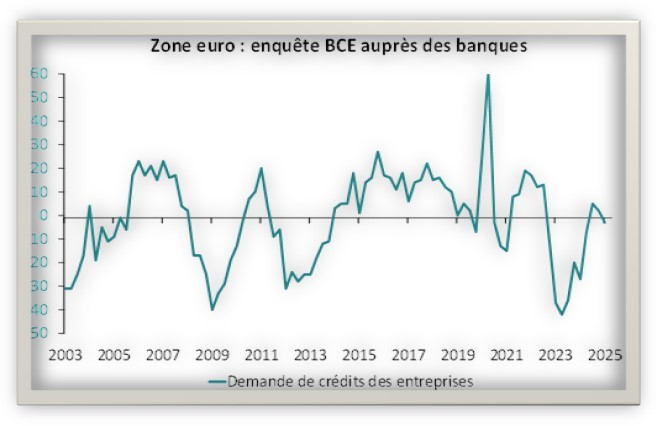The ECB’s (*) survey on bank lending conditions in the euro area, published today, reports a slight tightening of loan conditions for businesses in Q1 2025. This follows the new tightening of standards reported in Q4 2024, after a year-long period of consistent improvement (see Chart 1). The caution of banks in lending is explained by the increased perceived risks related to the general economic outlook and company-specific prospects. Loan conditions for households, on the other hand, have eased for home purchases but tightened for consumer credit. Demand for business credit has returned to slightly negative territory (see Chart 2), after two quarters of weak recovery, while household loan demand remained strong.
In detail, the survey shows that the tightening of credit conditions for businesses in Q1 was weaker than anticipated by the banks and also weaker than in the previous quarter. Conditions tightened in Germany, while they remained unchanged in the three other largest economies of the euro area. Credit conditions were slightly tighter for large company loans and long-term loans, while they remained unchanged for small and medium-sized enterprise (SME) loans and short-term loans. Banks expect a further slight tightening in Q2 2025.
For households, banks reported more accommodative conditions for home purchases but more restrictive conditions for consumer credit. Competition among banks has favored home loan conditions, while risk perception has had a tightening effect on consumer credit conditions. As previously observed, the improvement in conditions for home purchases is largely driven by developments in France for the fifth consecutive quarter. Banks anticipate a tightening of credit conditions for households (housing and consumption) in Q2 2025.
On the demand side, the details show that demand for business loans has decreased mainly due to a negative contribution from business inventories and working capital, despite the support of lower interest rates. Investment remains a neutral factor for loan demand, with some banks referring to political and geopolitical uncertainties as moderating factors for long-term planning. There is significant disparity between countries: loan demand is rising in Germany and Spain; it is stable in Italy, while it is sharply declining in France. Banks anticipate a slight increase in loan demand in Q2 2025.
For households, demand for home loans continued to rise strongly in Q1 2025, driven primarily by lower interest rates but also by better prospects for the housing market. This increase in demand was widespread across all euro area countries. Banks anticipate a further increase in demand in Q2 2025.
Overall, the results of the April survey indicate that the transmission of monetary easing is continuing slowly. Economic, trade, political, and geopolitical uncertainties continue to affect banks' willingness to lend, and demand is still lacking in dynamism. These results reflect the caution of banks and will obviously be commented on by the ECB at the next monetary policy meeting (Thursday). The ECB is very likely to once again reduce the restrictive nature of its monetary policy by 25 basis points, leaving the deposit rate at 2.25% versus the status quo initially expected in our scenario. The ECB will undoubtedly argue that the disinflation process is indeed underway, in a context where energy prices are much lower, the euro is stronger, inflation expectations have significantly decreased, and uncertainties continue to weigh on economic activity. The ECB will remain in "risk management mode."
(*) ECB survey conducted between March 10 and 25, 2025 (155 banks surveyed, with a 99% response rate).


DISCLAIMER
This document is intended for informational purposes only.
Groupama Asset Management and its subsidiaries disclaim any liability in the event of alteration, distortion, or falsification of this document. Any unauthorized modification, use, or distribution, in whole or in part, in any form whatsoever is prohibited.
Before making any investment, investors must review the prospectus or the Key Investor Information Document (KIID) of the UCITS. These documents, along with other periodic reports, are available free of charge upon request from Groupama AM or at www.groupama-am.com.
This non-contractual document does not constitute a recommendation, a solicitation, or an offer to buy, sell, or trade, and should not be interpreted as such.
The sales teams of Groupama Asset Management and its subsidiaries are available to provide you with personalized recommendations.
Published by Groupama Asset Management – Registered office: 25 rue de la Ville l’Évêque, 75008 Paris – Website: www.groupama-am.com